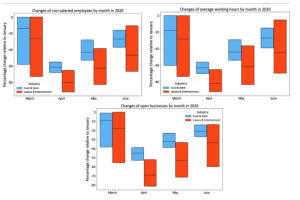COVID-19 affected many sectors of the world, and the hospitality industry is among the hardest hit (Krishnan et al., 2020). Research done earlier in the pandemic showed that the losses made because of the world situation would take until later in 2023 for the hotel and tourism industry to recover (Krishnan et al., 2020). The relaxation of COVID-19 measures was the light at the end of the tunnel for nations like the United Arabs Emirates that rely on hospitality to fulfill their economic diversification strategy.
As the world tries to find its foot in the new normal, the hospitality industry spots changes in its operations. Therefore, as hospitality performance recovery forges forward in much of the world, the need for timely data and analysis remains as great as ever. Different nations gauge their performance in hospitality industries using the revenue per available room (RevPAR) (Schwartz, Altin & Singal, 2017).
According to Eggleston and Lee (2021), the US hotels hit an average room rate (ARR) of 59.3%, the highest since pre-pandemic, and achieved a milestone of $69.81 in RevPAR. In Canada, the COVID-19 measures were held for much longer; thus, the occupancy remained at a depressed 28% higher than the realized rates during the heat of the pandemic but much less than the pre-pandemic period (Eggleston & Lee, 2021).
Impact of COVID-19 on the Hospitality Industry in UAE
Similarly, in Abu Dhabi, the hotel occupancy rates improved month on month in August to 69% in 2022 from 65.5% pre-pandemic but an 8% decline from 2021. However, the year-to-date (YTD) reports show positive performance in the earlier quarters as hotel occupancy rises by 3% to 71% in 2022. This increase can be attributed to the 29% (318k) rise in hotel guests in 2022 compared to 245.4k in 2021 and even less in 2020.
Things are looking even brighter for Abu Dhabi as they have received 2253k guests in the first two quarters of 2022 (25% rise). There was a 3% decline in their RevPAR post-pandemic and 1% during the pandemic. However, these values remain 2.7% higher than the pre-pandemic levels of August 2019. The ARR stood at Dh270 in August, surpassing the pre-pandemic levels of August 2021 by 9%.
In August 2021, Abu Dhabi reported a 3.0% (256.2MN) increase in revenues and a subsequent 9% (278MN) in the following year (Department of Culture and Tourism-Abu Dhabi, 2022; Department of Culture and Tourism-Abu Dhabi, 2022). Traversing through pre-, during, and post-pandemic, Abu Dhabi has managed to raise revenue from the hospitality industry.
hotel booking and the impact of COVID-19 on the Hospitality Industry

Generally, the longer a person stays booked into a hotel room, the more revenue per available room the hotel realizes and more revenue. Compared to August 2020, Abu Dhabi reported a 14.6% increase in the average length of stay (ALOS) to 3.5 nights. Conversely, the August 2022 reports show a 16% decline in the ALOS to 2.9 nights. Similar to the pre-pandemic period, many guests visiting the UAE and going to Abu Dhabi are booking with 5-star hotels (34% rise), but they spend less than the 3.4 days reported in 2021.
Furthermore, all the other hotel types are reporting a decline in their ALOS post-pandemic (5-star hotels-10%, 4-star hotels-5%, 1-3-star hotels-17%, and hotel apartments-9%) (Department of Culture and Tourism-Abu Dhabi, 2022; Department of Culture and Tourism-Abu Dhabi, 2022). In sum, reports from Abu Dhabi have shown tremendous growth in the tourism industry at rates that out-space recorded pre-pandemic. This exemplary performance has been attributed to the unlimited support and directives from the UAE’s leadership and their keen focus on tourism (Krishnan et al., 2020).
References for the Impact of COVID-19 on the Hospitality Industry
Department of Culture and Tourism-Abu Dhabi. (2022). Hotel Performance Reports. department of culture and tourism Abu Dhabi. Retrieved November 11, 2022, from https://tcaabudhabi.ae/en/who.we.are/reports.statistics.aspx
Department of Culture and Tourism-Abu Dhabi. (2021). Hotel Performance Reports. department of culture and tourism Abu Dhabi. Retrieved November 11, 2022, from https://tcaabudhabi.ae/en/default.aspx
Eggleston, K., & Lee, M. (2021, August 9). Hospitality industry moves into post-pandemic recovery mode. Hotel Management. Retrieved November 11, 2022, from https://www.hotelmanagement.net/operate/hospitality-industry-moves-post-pandemic-recovery-mode
Krishnan, V., Mann, R., Seitzman, N., & Wittkamp, N. (2020). Hospitality and COVID-19: How long until ‘no vacancy’for US hotels?
Schwartz, Z., Altin, M., & Singal, M. (2017). Performance measures for strategic revenue management: RevPAR versus GOPPAR. Journal of Revenue and Pricing Management, 16(4), 357-375.





